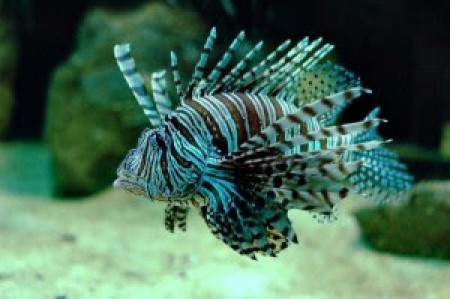Antigua Prepares for Lionfish Tournament
ST. JOHN’S, Antigua – Officials within the tourism ministry are preparing for the upcoming lionfish tournament from November 18-20.
 Co-sponsored by the local Elkhorn Marine Conservancy and the California-based non-profit Lionfish University, the tournament will be capped with a festival in Nelson’s Dockyard on November 20.
Co-sponsored by the local Elkhorn Marine Conservancy and the California-based non-profit Lionfish University, the tournament will be capped with a festival in Nelson’s Dockyard on November 20.
Lionfish are an invasive fish that are eating their way through native fish populations on coral reefs in the western Atlantic Ocean.
“Antigua is a beautiful island, and our economy and people depend on our reefs,” says the event’s coordinator Martha Watkins-Gilkes.
“We have a special responsibility to protect our marine resources, not only for our own and our island visitors’ enjoyment, but for tomorrow’s children.
“The derby will help us protect the reefs by removing lionfish and the festival will allow us to educate citizens about the importance of supporting and protecting our marine ecology.”
With more than EC$37,000 up for grabs in cash prizes, the tournament will reward lionfish hunters for the most, the largest, and the smallest lionfish captured.
There will be two days of lionfish hunting by scuba divers and freedivers on November 18 and 19, culminating in the cash awards and a lionfish cook-off by some of Antigua’s top chefs on November 20.
Lionfish are delicious, low in mercury, and high in Omega-3 fatty acids. But many fear catching or fileting them because they have 18 venomous spines.
There are ways to hunt and handle lionfish and minimize the risk of stings.
The Lionfish University says one can reduce the risk of getting stung by knowing where the venomous spines are.
“Avoid all the tall, thin vertical spines on the back of the fish. They also have one venomous spine on each side at the base of the two pelvic fins, and three on the front edge of the anal fin under the back end of the fish,” a release said.
“When hunting or handling lionfish, using puncture-resistant gloves is a smart choice. Another not so obvious piece of protective equipment is shoes. A lot of stings have happened when fish are accidentally dropped on bare feet while handling them on a boat, or by a diver accidently stepping on a fish or spine on the deck.
“When catching lionfish underwater, hunters should use a hard-sided container to safely hold their catch.
“Hunters should always dive with a buddy so one can spear while the other keeps an eye out for predators. In some places, sharks, eels, and other predators recognize hunters and can be aggressive when they know there might be free food,” the release added.


